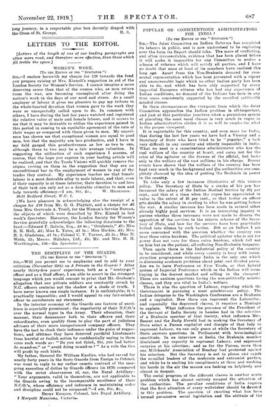THE DISCIPLINE OF THE GUARDS.
[To THE EDITOR OF THE " SPECTATOR."J you permit me to emphasize and to add to your criticism (November 15th) on A Private in the Guards ? After nearly thirty-five years' experience, both as a " sentry-go " officer and as a Staff officer, I am able to assert in the strongest language which you would consent to print that Mr. Graham's allegation that our private soldiers are constantly struck by N.C. officers contains not the shadow of a shade of truth. I have never known one single instance. It is unthinkable; it is practically impossible; and I would appeal to any fair-minded officer to corroborate my statement.
In the interior economy of the Guards one feature of excellence is especially prominent : the superiority of their N.C.O.'s over the normal types in the Army. Their education, their manner, their demeanour both to their officers and their subordinates, even qualify them toplay the part of judicious advisers of their more inexperienced company officers. They have the tact to cloak their influence under the guise of suggestions, and ofttimes they have deterred youthful Lieutenants from hurtful or foolish action by confidentially saying to them some such words as : "Do you not think, Sir, you had better do so-and-so," or " avoid doing so-and-so ? " As a rule the tiro will profit by such hints.
My father, General Sir William Knollys, who had served for nearly forty years in the Scots Guards from Ensign to Colonel, was wont to reply to my rather caustic contrast of the easygoing execution of duties by Guards officers (in 1870) compared with the strict observances of, say, the Royal Artillery: " Your arguments, valid in themselves, are not applicable to the Guards owing to the incomparable excellence of their N.C.O.'s, whose efficiency and influence in maintaining order and discipline could not be surpassed."—I am, Sir, &c., HENRY KNOLLTS, Colonel, late Royal Artillery. 2 Morpeth Mansions, Victoria.






































 Previous page
Previous page